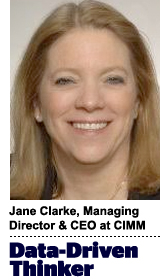 “Data-Driven Thinking” is written by members of the media community and contains fresh ideas on the digital revolution in media.
“Data-Driven Thinking” is written by members of the media community and contains fresh ideas on the digital revolution in media.
Today’s column is written by Jane Clarke, managing director and CEO at the Coalition for Innovative Media Measurement (CIMM).
As 2018 gets underway, there is one issue that should be at the top of everyone’s list in the new year: data quality.
Certainly, transparency and data accuracy were already dominant topics in 2017, but as the industry moves toward ever more granular forms of targeting and measurement, while combining differing data sets, the need for assurance that the information represents what it purports to represent will become even more critical as the year progresses.
2017 saw some solid progress taken toward addressing this.
CIMM and ARF proposed a data labeling initiative to create a “nutritional label” for data, enabling users of third-party data to understand its source and composition. A similar effort is being undertaken by the IAB.
The initiatives provide a critical first step in ensuring confidence and trust in the data that’s used in increasingly granular and effective targeted advertising. It, in effect, helps marketers to better understand the impact of their advertising efforts and the role that the data played in those outcomes. Innovation in targeting would stall if uncertainty about data – the “raw ingredient” used – persisted.
While the approaches being undertaken by these associations differ, they do complement each other, and each has merits and challenges. The CIMM-ARF initiative is broader in scope than the IAB’s initiative, which is limited to digital media and doesn’t include a TV focus. CIMM and ARF want to make the labeling appropriate to audience-based buying in TV, and also bring more buyers into the process.
But as is sometimes the case with our industry, methodology and technology are not the main impediments to addressing challenges – consensus and unanimity are.
At this stage, what is needed is not that the perfect solution be found, but that the first step be taken together. The best technology or methodology at this point is not all that is needed to achieve the objective. It is also important that all facets of the industry agree that the end goal is of sufficient importance that we move forward together. Working together, the best approach for ensuring transparency on data quality will emerge.
Certainly, an agreement on a universal data identification protocol benefits everyone. The stakeholders for such a protocol are primarily the data owners, but the benefits are widespread. And while the initiative is focused on disclosure, there is also a validation aspect to the project.
It promises to successfully link together all current and future big data sets used to accurately measure the consumer journey across platforms. Data labeling, which would be an actual listing of the components, sources and characteristics that were compiled to create targets, would raise overall data quality because of its focus on transparency. But it also requires a uniform, agreed-upon structure so all interested parties can participate and an implementation process created that fits into both standard and proprietary systems.
There are inherent challenges in gaining consensus on technically complicated problems and navigating the natural forces of competitiveness that define our industry and make it great. For example, as the information for the labels would first be self-reported, vendors could, of course, provide misleading or incorrect information. But that misinformation would ultimately be revealed through third-party validation.
At the moment, we don’t even know how many lists and providers would participate. But through this process, undoubtedly some of the poorer-quality lists and providers would be found out as third-party validation and experience of matching reality to reported information kick in.
Never has the need for consensus and placing cooperation over competition been greater than in finding systems to advance data quality. All that we want to accomplish as an industry, in terms of better targeting and accurate measurement, depends on confidence in the data on which we base insights and decisions.
I am interested in people’s ideas, approaches and their “aha” moments for how to best ensure data quality. As 2018 gets underway, let’s take that first step to this goal together as a statement on how even when dealing with the most challenging of issues, consensus can emerge as the greatest trend in the year ahead.
Follow CIMM (@CIMM_NEWS) and AdExchanger (@adexchanger) on Twitter.












